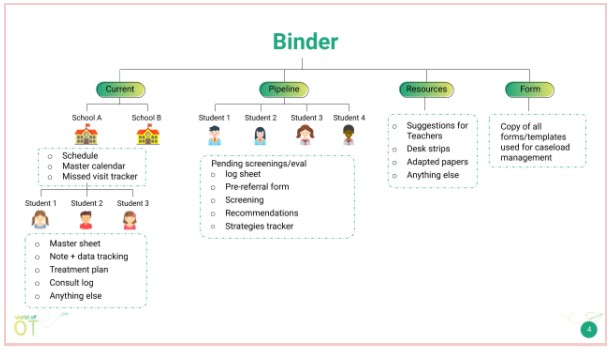Special Feature: How To Manage Workload Stress in the Pandemic Era

Editor’s Note: PediaStaff would like to once again welcome Ushma Sampat as a PediaStaff blog contributor. Ushma helps school based OTs hit the ground running with confidence rather than overwhelm through an Online CEU Course which includes templates and mentoring – Literally everything she wished she had when she was new to the school system!
Ushma is an immigrant OT entrepreneur, mother of two boys and a dog, a loved and lucky wife, a traveler and adventure seeker who founded World of OT – a community based OT practice in San Francisco to serve not only children, but also their whole world – parents, teachers and other professionals.
Follow her on IG @WorldofOT or join her FB group ‘New to School OT’ for more resources!
School-Based Therapists: How To Manage Workload Stress in the Pandemic Era
In continuing to deal with the fallout of the COVID-19 pandemic and how it has changed the way we navigate our careers, it is important to discuss some of the stressors that school-based therapists have been dealing with during this time and how we can handle it effectively through the resources at our disposal and collaboration with our peers. During this pandemic, we have witnessed fewer paraprofessionals in the classroom, combination of and switching between virtual and in person service (which is obviously a scheduling and planning nightmare!!) and on top of this, we are seeing an increase in the number of caseloads per therapist and countless more children who are falling behind in receiving the treatment that they need in order to succeed in the classroom. As concerning as this sounds, if you are dealing with any of this — you are not alone! Many other school-based therapists know exactly what you are going through and experiencing it in some capacity.
Here are some tips and resources for managing your caseloads, making the best use of your time per week to complete clinical tasks, and how to organize yourself in a way that can alleviate the stress that can come from overwhelming caseloads. Hopefully, some of these ideas will help you to better serve the children and schools you work at – with less stress.
What are your go to ways to reduce stress? Please share in the comments below, so that it might help someone else!
Organization Strategies
One of the most important strategies to combat stress is to stay organized and create a robust system for yourself that will help you manage your workload in an effective manner. A robust organization system can be achieved through a physical binder or a digital system. Both of which are included as part of resources in my school based OT course but here’s a brief example of what this system with its division and subdivisions could look like:

Pre-Referral Process
Creating and incorporating a robust pre-referral system is another powerful way to combat stress. It may be helpful to start conversations with supervisors on how the team needs to set clear expectations and boundaries to streamline how referrals are coming in – if this is something that is not already in place. A pre-referral process helps minimize excessive, premature or inappropriate referrals – which will save you valuable time, allowing you to focus on the goals for the students while still being able to provide support for the team and school in general. Learn more about the pre-referral process through this blog to enhance the efficiency of your team! To truly make the pre-referral process successful, we as therapists are going to have to support the teachers in ways beyond 1:1 therapy sessions- by providing training, tools and strategies to implement before the formal referral is made and that is where the next suggestion comes in.
An RTI Approach
In addition to the pre-referral process, an RTI approach can help reduce referrals by providing proactive services on a multi-tier approach that aims at early identification and supporting students with learning and behavior needs. A school based therapist can offer valuable strategies and interventions along the tiered continuum of intensity. Where Tier 1 is a whole classroom intervention like educating and training teachers, Tier 2 is a small group intervention for handwriting support, and Tier 3 may include recommending strategies and setting systems to support a student that needs more support with executive functioning skills. This approach gives us the opportunity to provide support to staff even when there is no particular student in mind and hence allows for greater student success in school and reduced referrals. Another significant thing to note is that any kid will qualify for services right now, but it’s lack of exposure and skill development rather than disability for so many. Therefore, it is important to use our clinical reasoning skills to tease this out while educating and supporting teachers appropriately.
Manage and Track Your Time
A great way to streamline an overbearing workload is to keep track of data using a time study. You can better keep track of the tasks you perform over a period of time by setting aside time each week to dedicate to specific tasks such as observations, evaluations, writing reports and referrals. This can help you further organize your time and give you an idea of what types of tasks and activities to expect and when each week. You can also sort out your time by calculating your hours and added responsibilities (including make-up services or influx of referrals even after putting the above suggestions in place) using this resource by AOTA, making a shift to a workload model (if not already using a workload model) and reviewing with your supervisor/ district to advocate for and ask for added resources (additional hours for you or an additional part-time therapist – short term or long term based on needs) to help bring you up to speed. Having data to prove where you are spending your time will be the most effective way to open the conversation.
Reflect
Now…before we even begin to apply any of these tips to manage our stress and caseloads, let’s take a step back and realize that we shouldn’t beat ourselves up for our current hardships. The pandemic and the way it took a toll on all of us was out of our control, so it is important to remind ourselves about why we love being a school based therapist. Maybe it’s helping kids overcome challenges through playful interactions, or perhaps it’s collaborating as a team with the teachers and other like minded professionals at the schools, or it’s the benefits of only having 180 working days in a year?!
What’s yours? I’d love to hear about what is driving you to continue the amazing work you are doing.
If you are looking for additional community support, consider joining our New to School OT Facebook group to connect with others navigating the same journey. I also have an online self paced school based OT course pre-approved for AOTA CEUs that you can consider signing up for if you are new to the school and want access to all the resources and information in one place to help yourself hit the ground running with confidence rather than overwhelm!
PediaStaff is Hiring!
All JobsPediaStaff hires pediatric and school-based professionals nationwide for contract assignments of 2 to 12 months. We also help clinics, hospitals, schools, and home health agencies to find and hire these professionals directly. We work with Speech-Language Pathologists, Occupational and Physical Therapists, School Psychologists, and others in pediatric therapy and education.
